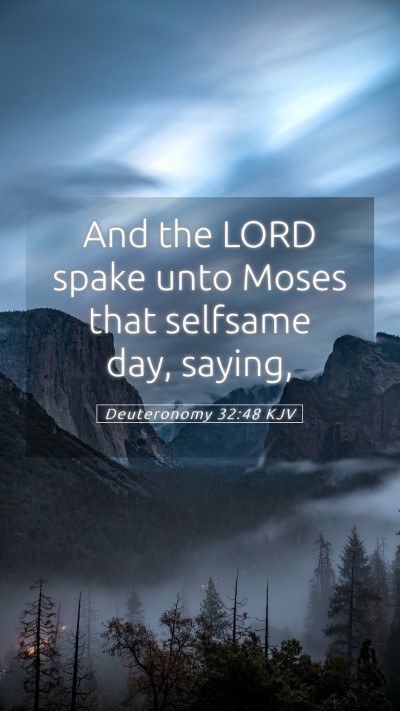Deuteronomy 32:48 - Verse Meaning and Commentary
Deuteronomy 32:48 states: "And the LORD spake unto Moses that selfsame day, saying." This verse marks a significant moment in the narrative of Moses as he is nearing the end of his life. Below, we explore the meaning, interpretations, and insights related to this verse, drawing from esteemed public domain commentaries.
Understanding the Context
The context of this passage is essential for a comprehensive understanding. Deuteronomy 32 is part of Moses’ farewell address to the Israelites, where he recites a song that encapsulates the history of Israel and God's faithfulness. In this short verse, we see the immediacy of God's communication with Moses, emphasizing the importance of the message that is about to follow.
Insights from Commentaries
Matthew Henry's Commentary
Matthew Henry emphasizes the solemnity of God's message to Moses, indicating that God's words carry immense weight, especially in moments of transition. This communication signifies God's ongoing relationship with His people, demonstrating both His authority and care. Henry notes that the timing ("that selfsame day") underlines the urgency of God's directives.
Albert Barnes' Notes
Albert Barnes highlights that this verse serves as a prelude to God’s final instructions to Moses regarding his impending death and the appointment of Joshua as his successor. Barnes stresses that this moment reflects God's preparation for Israel’s future, ensuring leadership continuity. Moreover, it reveals God’s concern for His people, as He provides guidance through Moses' subsequent commands.
Adam Clarke's Commentary
Adam Clarke elaborates on the significance of God's spoken word by noting that this instance reinforces the concept that revelation is often linked closely with critical transitions in leadership and covenant. Clarke suggests that the 'selfsame day' reference emphasizes God's faithfulness to His timeline and plan for Israel, crafting a narrative that assures the Israelites of divine guidance as they move forward without Moses.
Key Themes and Significance
- Divine Communication: The direct speech from God indicates the closeness of the relationship God maintains with His prophets.
- Leadership Transition: This verse is pivotal for understanding the transition from Moses to Joshua and the continuity of God’s plan for the Israelites.
- Historical Context: Noting this moment in Israel's history helps in grasping the broader narrative of God’s covenantal interactions with His chosen people.
Applications for Today
Understanding Deuteronomy 32:48 holds value in both personal and communal Bible study contexts. Here are some practical applications:
- Bible Study Groups: This verse can prompt discussions about how God communicates with leaders and the importance of heeding divine instruction.
- Online Bible Study: Engaging with this verse through online platforms can facilitate a deeper understanding of God’s guidance in our lives today.
- Bible Study Tools: Utilize various commentaries to delve deeper into the ramifications of God's communication with Moses.
Additional Cross References
Related Bible verses that enhance the understanding of Deuteronomy 32:48 include:
- Numbers 27:18 - The appointment of Joshua as Moses' successor.
- Deuteronomy 31:14 - The commissioning of Joshua in front of all Israel.
- Exodus 3:10 - God's call to Moses and his mission to lead Israel out of Egypt.
Conclusion
In summary, Deuteronomy 32:48 serves as a pivotal reminder of God's active role in guiding His people through leadership transitions. The insights gleaned from biblical commentaries enhance our understanding of this verse, offering a rich tapestry of meanings and applications that extend to our lives today. By engaging in thoughtful Bible study, one can uncover deeper lessons and applications of Scripture.
Final Thoughts
This exploration of Deuteronomy 32:48 illustrates not just the significance of the verse itself, but also the broader implications of God’s communication within the narrative of the Israelites. For any believer seeking to understand Scripture, this verse serves as a foundation for recognizing the importance of divine guidance in leadership, community, and individual faith journeys.


